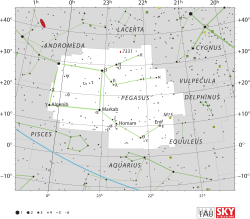离宫四
(重定向自HD 215182)
离宫四,即飞马座η(η Peg,η Pegasi)是一个位于飞马座的双星系统,距离地球约167光年。
离宫四在飞马座的位置 | |
| 观测资料 历元 J2000.0 | |
|---|---|
| 星座 | 飞马座 |
| 星官 | 室宿 离宫 |
| 赤经 | 22h 43m 00.13743s[1] |
| 赤纬 | +30° 13′ 16.4822″[1] |
| 视星等(V) | +2.95[2] |
| 特性 | |
| 光谱分类 | G2 II + F0 V[3] |
| U−B 色指数 | +0.57[2] |
| B−V 色指数 | +0.86[2] |
| 天体测定 | |
| 径向速度 (Rv) | +4.3[4] km/s |
| 自行 (μ) | 赤经:–100.06[1] mas/yr 赤纬:+15.46[1] mas/yr |
| 视差 (π) | 19.51 ± 0.18[1] mas |
| 距离 | 167 ± 2 ly (51.3 ± 0.5 pc) |
| 绝对星等 (MV) | –1.18[5] |
| 轨道[6] | |
| 绕行周期 (P) | 813 天 |
| 偏心率 (e) | 0.183 |
| 近心点 历元 (T) | 2452025 HJD |
| 近心点幅角 (ω) (secondary) | 344.7° |
| 半振幅 (K1) (primary) | 14.37 km/s |
| 详细资料 | |
| η Peg A | |
| 质量 | 3.82 ± 0.52[7] M☉ |
| 半径 | 18[8] R☉ |
| 表面重力 (log g) | 2.40[9] |
| 亮度 | 247[7] L☉ |
| 温度 | 5,450[7] K |
| 金属量 [Fe/H] | +0.39[9] dex |
| 自转 | 818[5] |
| 自转速度 (v sin i) | 1.4[6] km/s |
| 其他命名 | |
特征
编辑离宫四的视星等为+2.95,[2] 是飞马座第五亮的恒星。根据视差测量,它距离地球约167光年(51秒差距)。[1]
离宫四由一对联星组成,两颗恒星相互旋转的周期为813天,轨道离心率为0.183。[6] 其中较亮的主星是一颗亮巨星,恒星光谱为G2 II,[3] 质量是太阳质量的4倍。[5] 通过干涉测量并矫正周边昏暗后测量出这颗恒星的角直径为3.26 ± 0.07角分,[11] 这意味着在距离地球167光年的实际位置上,它的半径约为太阳半径的18倍。[8] 它的亮度是太阳亮度的247倍,[7] 表面温度为5,450K。[7] 这颗恒星的自转比较慢,视向自转速度为1.7 km·s–1,自转周期约为818天。[5] 离宫四的伴星是一颗F-型主序星,恒星光谱为F0 V.[3]。在天球投影上,这对联星附近还有两颗G型恒星,目前尚不知道是否和这对联星有物理联系。
离宫四和危宿一(宝瓶座α)、虚宿一(宝瓶座β)三颗中等质量的恒星组成一个恒星群落,它们在星际运动的方向垂直于银河面。[12]
命名
编辑离宫四在西方的传统名字为Matar,来自于阿拉伯语Al Saʽd al Maṭar(سعد المطر),意思为“幸运雨之星”。在中国古代星官系统中,离宫四属于北方玄武七宿中室宿离宫(表示皇帝的行宫)第四星,这也是离宫四名字的来由。[13]
大众文化
编辑美国海军有一艘货船“USS Matar (AK-119)”是以离宫四的英文名Maṭar命名。
参考资料
编辑- ^ 1.0 1.1 1.2 1.3 1.4 1.5 van Leeuwen, F. Validation of the new Hipparcos reduction. Astronomy and Astrophysics. November 2007, 474 (2): 653–664. Bibcode:2007A&A...474..653V. doi:10.1051/0004-6361:20078357.
- ^ 2.0 2.1 2.2 2.3 Johnson, H. L.; et al. UBVRIJKL photometry of the bright stars. Communications of the Lunar and Planetary Laboratory. 1966, 4 (99). Bibcode:1966CoLPL...4...99J.
- ^ 3.0 3.1 3.2 Parsons, Sidney B.; Ake, Thomas B., Ultraviolet and Optical Studies of Binaries with Luminous Cool Primaries and Hot Companions. V. The Entire IUE Sample, The Astrophysical Journal Supplement Series, November 1998, 119 (1): 83–104, Bibcode:1998ApJS..119...83P, doi:10.1086/313152
- ^ Wilson, Ralph Elmer. General Catalogue of Stellar Radial Velocities. Washington: Carnegie Institution of Washington. 1953. Bibcode:1953QB901.W495......
- ^ 5.0 5.1 5.2 5.3 Pizzolato, N.; Maggio, A.; Sciortino, S., Evolution of X-ray activity of 1-3 Msun late-type stars in early post-main-sequence phases, Astronomy and Astrophysics, September 2000, 361: 614–628, Bibcode:2000A&A...361..614P
- ^ 6.0 6.1 6.2 Massarotti, Alessandro; et al, Rotational and Radial Velocities for a Sample of 761 HIPPARCOS Giants and the Role of Binarity, The Astronomical Journal, January 2008, 135 (1): 209–231, Bibcode:2008AJ....135..209M, doi:10.1088/0004-6256/135/1/209
- ^ 7.0 7.1 7.2 7.3 7.4 Hohle, M. M.; Neuhäuser, R.; Schutz, B. F., Masses and luminosities of O- and B-type stars and red supergiants, Astronomische Nachrichten, April 2010, 331 (4): 349, Bibcode:2010AN....331..349H, doi:10.1002/asna.200911355
- ^ 8.0 8.1 Lang, Kenneth R., Astrophysical formulae, Astronomy and astrophysics library 1 3, Birkhäuser, 2006, ISBN 3540296921. The radius (R*) is given by:
- ^ 9.0 9.1 Luck, R. Earle; Wepfer, Gordon G., Chemical Abundances for F and G Luminosity Class II Stars, Astronomical Journal, November 1995, 110: 2425, Bibcode:1995AJ....110.2425L, doi:10.1086/117702
- ^ MATAR -- Star in double system, SIMBAD Astronomical Object Database (Centre de Données astronomiques de Strasbourg), [2012-03-03], (原始内容存档于2020-01-11)
- ^ Richichi, A.; Percheron, I.; Khristoforova, M., CHARM2: An updated Catalog of High Angular Resolution Measurements, Astronomy and Astrophysics, February 2005, 431: 773–777, Bibcode:2005A&A...431..773R, doi:10.1051/0004-6361:20042039
- ^ Ayres, Thomas R.; Brown, Alexander; Harper, Graham M. Chandra Observations of Coronal Emission from the Early G Supergiants α and β Aquarii. The Astrophysical Journal. July 2005, 627 (1): L53–L56. Bibcode:2005ApJ...627L..53A. doi:10.1086/431977.
- ^ 香港太空馆 - 研究资源 - 亮星中英对照表 互联网档案馆的存档,存档日期2010-08-18.
